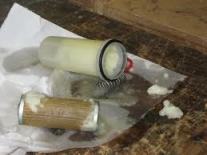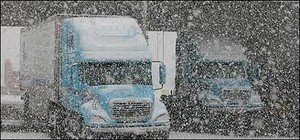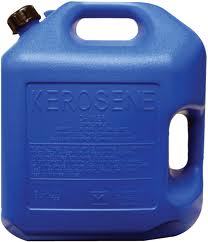Prevent Diesel Gelling and be King of the Road This Winter!
“ Who said you should be afraid of the cold? Real drivers conquer it as if it’s just another adventure down the road. Curious as to how? Read on… “
The winter months are one of the hardest for truck drivers. Besides from the usual danger they face in driving over snow and the uncomfortable lifestyle of dealing with the cold, another problem that they are constantly worrying over is the state of their fuel.

Example of diesel gelling.
The Cold, The Engine, The Fuel
The fuel normally bought from pumps is called #2 Diesel—a type that contains the liquid form of paraffin wax. When temperatures start to drop at 32 degrees, this liquid wax will start to crystallize, causing the fuel in the tank start to cloud. At 10-15 degrees, the fuel will completely start to gel and not only clog the tank but the lines and fuel filters as well.
One of the ways drivers can try to prevent diesel gelling when they are resting or sleeping is to put the engine on idle. Doing this, however, is a very bad habit because it wastes fuel and also causes some damage on the engine as well.
There are many different ways to skip the engine idle and keeping your fuel safe and warm in your tank. We briefly discuss procedures to prevent diesel gelling below.

Be the King of the Road This Winter
The Winter Blends
Manufacturers create winter blends for distribution which is a mix of #2 and #1 diesel. The #1 type is more refined and has lower temperature requirement for gelling so it lessens the possibility of diesel gelling from happening. Winter blends, moreover, are blended according to the location. For example, companies can offer an initial 75/25 mix and increase this to a 50/50 one for people who need to go farther north. The latter winter blend can be a mixture of #52 fuel oil and kerosene which is usually used outside above ground oil tanks to prevent congealing of the product. More details below.
The Additives
Another common option is the use of additives or diesel fuel conditioners to prevent diesel gelling. Additives are a cost-effective option that is added to the fuel to improve performance and prevent diesel gelling. They are formulated to reduce the rate of the gelling of the diesel by preventing the grouping together of the wax crystals. Premium quality winter additives offer additional benefits nowadays such as cold flow improvers that reduce CFPP (Cold Filter Plugging Point), cetane enhancers for cold starting improvement, and detergents that get rid of the deposits stuck on the injectors.
Using a diesel additive formulated to cold plug point of diesel can also help. These products not only prevent diesel gelling but also improves the capabilities of the diesel.
 The Kerosene Solution
The Kerosene Solution
Adding kerosene to diesel is one of the oldest tactics to prevent diesel gelling. Adding it to the diesel reduces its viscosity which makes it less likely to gel under cold weather. When using kerosene, the diesel ratio needed according to the temperature in which the vehicle operates should be determined. For example, low amounts like 20 parts to 80 parts diesel fuel are mixed for temperatures of -10 Celsius and below. The amount of kerosene should be increased the lower the temperature becomes. This greatly affects the cloud point of diesel fuel. The only real problem with kerosene is trying to haul it around with you in a safe and efficient manner so that when you need it, you have it. This is once again where the right concentrated additive may be a better choice, since it is smaller, easier and much safer to have on board or use during a fill up. To learn more about how to use the right diesel fuel conditioner, click here.
About the Author
Tech Guy
Automotive enthusiast, passionate about Jeeps, hot-rods, turbos, performance, efficiency, diesels, fuels, high performance oils, additives and anything with an engine.

